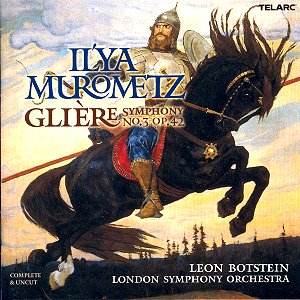I had little previous firsthand knowledge of
Glière's music, other than Stokowski's championing and
recording of the work being discussed here and hearing a few balletic
excerpts. I enjoyed making the acquaintance of the full, uncut
version (all seventy two minutes of it!) of the monumental, programmatic
"Il'ya Murometz". Although late Romanticism is not a major focus
of my listening, I was gripped from start to finish by the consummate
mastery of the highly evocative construction of this score. The
work is largely free from Straussian self-importance and bombast,
although employing similar large-scale techniques. This musical
story of a knight-errant's eventful wanderings is given a performance
of great stature by the LSO under Leon Botstein who, I admit,
I have previously rarely encountered. I'd like to think the blueprint
for the work comes more from Russian than German models and more
than once was reminded of the music of Rimsky-Korsakov, a composer
far more important and forward-looking than he is sometimes given
credit for (Christmas Eve is a particular personal favourite
work in this context).
The work begins with a twenty-two minute(!) opening
movement, Wandering Pilgrims, which is epic in every sense
of the word yet thankfully fails to come over as being "over the
top" at any point. There is the occasional bout of cloying sentimentality
but, for the most part, the construction hangs together very well,
considering it is longer than most more recent symphonies are
in total. The second movement (marked Andante) is almost
as long as the first and, in its evocation of a dark forest and
its inhabitants, is the "most Wagnerian of the four", according
to Anthony Burton's informative notes. The mood changes somewhat
with the much shorter, more sprightly and lighter sounding Scherzo,
portraying Il'ya at the court of "Vladimir the Mighty Sun", almost
Elgarian in its more noble, slower melodies.
The work concludes with another orchestral tour-de-force,
virtually as long as the first movement, in which we are afforded
"The Heroic Deeds and Petrification of Il'ya Murometz". Despite
Glière's reputation for being musically very much rooted
in the late 19th century, such simplifications are
soon put to rest with passages that could easily hold their own,
in terms of momentum, with Shostakovich or early Sibelius. There
is not the sense of genius that colours almost anything you would
care to hear by Mussorgsky. However this is definitely the music
of more than an also-ran. I am not sure that the highly detailed
booklet synopsis of Il'ya's legendary feats is in the last analysis
that helpful. In the end I gave up and listened to the music as
music and was not disappointed. The impending doom heralded by
the brass around ten minutes into the finale is as incisive as
anything in, say, the Symphonie Fantastique.
This fairly unusual new release for this work
should gain plenty of friends, with a superlative recording and
performance that ought to appeal to the late-Romantic orchestral
specialist and Russophile alike.
Neil Horner

